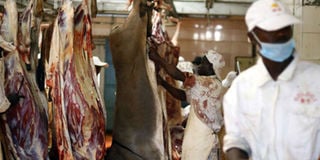Donkey abattoir raises a stink in Baringo county

The donkey slaughterhouse in Mogotio, Baringo County. Donkey prices depend on their weight, with an animal weighing between 150-160kg fetching a farmer between Sh8,500 and Sh9,000. PHOTO | DANIEL NYASSY | NMG
What you need to know:
- The Sh300 million Goldox Kenya Limited abattoir at Chemogoch, the first of its kind in the region, is now raising health concerns
- The slaughterhouse now faces closure after the regional Environment department raised concern on the stench.
The setting up of a multi-million donkey slaughterhouse in Mogotio, Baringo County, two years ago was expected to transform the economic fortunes of the arid region.
But the Sh300 million Goldox Kenya Limited abattoir at Chemogoch, the first of its kind in the region, is now raising health concerns, thanks to a foul smell emanating from the facility.
The slaughterhouse now faces closure after the regional Environment department raised concern on the stench. The Baringo county government has since issued a notice to the management of the company to address the issue.
Close down facility
The county government chief officer in charge of Environment, Mr Collins Cheruiyot, said the devolved unit would have no option but to close down the facility if the management did not manage its effluent effectively.
“They have not addressed the environment hazard of the foul smell emanating from their facility. We will close the abattoir if they don’t abide by this,” the letter addressed to the slaughterhouse, seen by the Sunday Nation, reads.
Efforts by the media to enter the slaughterhouse last week proved futile as they were barred by the management. No one at the company was willing to talk about the issue.
What hits your nostrils as you drive on the busy highway is the foul smell from the abattoir, which has a capacity to slaughter 100 donkeys a day.
Expectations were high that herders and the factory would be winners in the donkey venture, targeting mainly the export market.
There have also been concerns that the facility is underutilised — with investors asking farmers to supply more animals to enable the slaughterhouse achieve its goal of operating round the clock.
About 200 people from the region have been employed by the abattoir.
Donkey prices depend on their weight, with an animal weighing between 150-160kg fetching a farmer between Sh8,500 and Sh9,000.
“The beauty of this business is that the payment is instant, as we want to encourage more farmers to join in,” said Mr Shadrack Mutai, a company official.
Lembus senior chief Julius Kangogo praised the project, noting that traders from as far away as Limuru who used to troop to the area to buy donkeys at throw-away prices of about Sh300 each, are now scarce.
“With the prices offered by the slaughterhouse, this is a golden opportunity for local farmers to keep more donkeys. I urge them to discard the cultural belief that donkeys are not meant for slaughtering,” said Mr Kangogo.
Residents who spoke to Sunday Nation while on a tour of the area recently, however, want the foul smell addressed if success of the project is to be guaranteed.
A veterinary expert in charge of the slaughterhouse, Dr Jonathan Tanui, said that no case of tetanus had been detected in the animals supplied.
He assured the public that each animal brought to the facility is examined and, in case any disease is detected, it is condemned and killed.
The facility received the nod from Agriculture Cabinet Secretary Willy Bett on April 1, 2015, and is targeting China, Russia and other Far East countries where donkey products are in high demand.
While donkey meat was legalised in Kenya in 1999, the same is yet to be publicly declared, creating a loophole where unscrupulous traders slaughter donkeys for sale to unsuspecting meat consumers.




